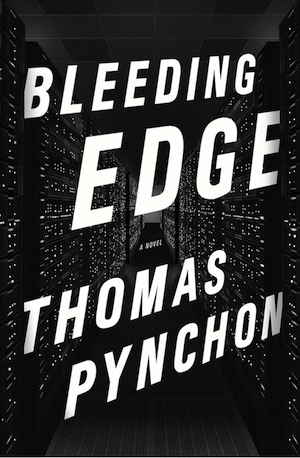The release of Bleeding Edge marks fifty years of Thomas Pynchon novels; five decades since V appeared in 1963. Fifty years of dense, exhilaratingly prose, extended moments of euphoria and revulsion, new fields and curiosities aplenty to explore whilst marvelling at Pynchon’s seemingly infinite knowledge – and of course boggle at the genius presenting it all to us in works of literature that number amongst the most beautiful ever written. That’s not to say they’re without headaches from the intricacies of plot, shoulder aches from lugging around the heavy tomes, and calendar dates gone missing from being so absorbed. (I know a girl who won’t speak to anyone for three months after they’ve read Gravity’s Rainbow, because, let’s face it, that’s really all you want to talk about after you’ve finished (and are probably reading again to figure out what the hell was going on.)
Bleeding Edge isn’t the big, sprawling "final novel" people might still be expecting. Though it is big. And sprawling. It’s hard to imagine anything surpassing 2006’s 1220-pages-at-last-edition Against The Day for that. Though one hopes, at this rate, that we’re blessed with at least one more grand final statement, this newest offering being the third Pynchon novel in seven years – as opposed to the four novels and one novella in the preceding forty-three. And, perhaps, with seven other works to compare it to now, we can begin to see more clearly the similarities within Pynchon’s vast universe: each book a seemingly complete encyclopaedia of everything, and yet there he goes again with a whole new shebang of the celebrated, obscure, technical, and the throwaway. And how cool is it that a 76-year-old man is writing about Bad Brains and the Jay-Z/Nas feud, as well as myriad other pop and fringe cultural reference points?
Hippie-ish West Coast lifestyle is contrasted throughout with the hustle and grit of New York City: keeping with a private investigator protagonist à la Doc Sportello of his last novel, Inherent Vice, and the beloved questing female lead perhaps best exemplified by Oedipa Maas of The Crying Of Lot 49, Bleeding Edge rolls these characters into one and transports them from their native 60s California to the Big Apple forty years later. This comes complete with the necessary attitude adjustment in the form of Maxine Tarnow – a decertified Fraud Examiner, with two boys, an ex-husband still somewhat around, a surfer/Buddhist therapist, competitive best friend, and increasingly bizarre clientele.
The novel begins on the first day of Spring 2001 and ends exactly one year later, taking in all things intertwined with that time – not only the events of September, but the aftermath of the tech bubble bursting, the concerns over where technology was heading, and the difficulties of raising and being part of a family in the modern world, the latter being a consistent and important theme for Pynchon. Just look at the wide web of Traverses first seen in Vineland and trailing back all through Against The Day.
It’s his funniest book yet, and they’re all, amongst a million other things, very funny: characters play "FTSE", there’s a strip club called Joie de Beavre, and plenty more including a long pun on a Scooby Doo movie plot to rival Vineland’s ‘check’s in the mayo’ gag. Pynchon’s genuine love of slapstick wordplay is given a wide field to play in with turn-of-the-millenium hipster irony abounding in New York at the time – and sure enough the geek elite are seen drinking Pabst Blue Ribbon and wearing ‘humorous’ t-shirts. His fondness for breaking into song continues, too – this time taking in karaoke, gangsta (or Gongsta) rap, Nazi Vegetable’s disco anthem ‘In The Toilet’ and that old Meatball Flag hit, ‘Soul Gidget’ – Inherent Vice, even resurfaces for eight bars.
Other old favourites cross our path, familiar faces welcome as we wander this vast terrain with real world disaster looming over us – quoting Corinthians about ‘suffering fools gladly’, ascribed, as before, to a particularly nasty piece of work, in this case a racist cab driver, and the oft-repeated American Indian belief that ‘if you save someone’s life, you are responsible for them from then on’. A Misha & Grisha keep popping up, counterparts to the identically named duo in Against The Day, bumbling, friendly, and violent, through whom Pynchon carries on his affair with the Russian language and culture. Tetris slides in again and a coupla great jokes about Russians using the word ‘the’. And then there’s the purely Pynchonian character of Conkling Speedwell. A professional Nose, aiding in various olfactory investigations whilst at the same time following his own obsession with Hitler’s cologne. He also has a friend who can sense scents from the future…
It’s interesting to look at Pynchon’s previous portrayal of September 2001 New York seen through the terrors unleashed by the ill-fated Vormance Expedition in Against The Day. Written closer to the time of the attacks, but placed within that novel circa 1898, the parallels are obvious and Pynchon seems to be speaking from his own heart when he writes “…the bad dream I still try to wake from, the great city brought to sorrow and ruin.” Whereas here non-fictional distance has allowed him to write of the time as it happened. For an author always acutely aware of the presence of ‘They’, the chosen milieu of Bleeding Edge is ripe for Conspiracy Theories: how much was known ahead of time is of course called into question, going beyond the normal conjectures set forth in a way only Pynchon can. The more absurd ideas are tempered with humour but the idea of ‘something going on’ is in no way dismissed. DARPAnet shows its face again (the precursor to the internet, mentioned also in Inherent Vice) and, along with the term ‘Ground Zero’, is given origins in the Cold War. There’s even a trip out to fabled Montauk. But it’s important to remember, before we attribute too much to Pynchon’s own beliefs, that this is what it was like in those fucked up days right after the disaster. Everyone was wondering aloud what the hell was going on, how this could possibly have happened, and the characters in Bleeding Edge spouting various theories, however you want to take them, recall almost precisely the real life roars of confusion blaring back then.
As much as anything can be said to be a focal point in the lush panorama that is a Thomas Pynchon novel, the action seems to centre around a computer program called DeepArcher: a boundless virtual universe where your route “is erased behind you”, leaving one free to dive deeper inside in the hopes of salvation. Pynchon being no stranger to Kabbalistic and other mystical ideas, DeepArcher also doubles as the astral plane. In a series of peculiar and random links, Maxine’s explorations into Deep Web soon land her in Deep Shit. Everyone wants DeepArcher’s source code, not least of all billionaire bad boy, Gabriel Ice. And federal agent Nicholas Windust is getting curious about where Maxine is probing, Windust himself rivaling Ice for scoundrel points – it’s not just thematic that he began his career present at the September 11th, 1973 bombings in Santiago, Chile. And Maxine can’t figure out why she’s getting so involved with him. Looking at these two men, we wonder where Pynchon’s ‘V’ for ‘villain’ is, a theme he’s used since, well, V. But listening closer to Gabriel’s surname, we hear an echo of the title of the last novel, Inherent Vice, its initial vibration missing and thus obvious. And could Windust’s ‘W’ be considered instead a double-V, even referencing the W in office at the time? On a less grand scale, minor Vs pop up here and there, including a nod to Nightmare On Elm Street with the firm of Voorhees, Kreuger, one of this author’s many beloved film references.
Dealing not only with grand scale events for both public and private eyes, Bleeding Edge also delves deep into the personal, probing the questions of why certain people enter our orbit and what attaches them to remain there. With this work Pynchon has covered nearly every year from the 1883 Chicago World’s Fair until present day. And of course – their names slyly mentioned on page 15 – Mason & Dixon’s time. Read this book, read all of Pynchon. As before, there is no one to compare him to now.

Bleeding Edge is published 17th September by Jonathan Cape


